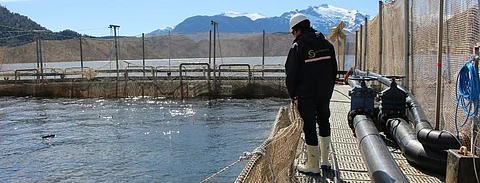

An official of Chile's National Fisheries and Aquaculture Service inspects a salmon farm.
Photo: Sernapesca.
Chile's National Fisheries and Aquaculture Service (Sernapesca) published the new 'Report on Antimicrobial and Antiparasitic Use in Salmon Farming' for H1 2024. Its results concluded that, during that period, there was an increase in the use of antimicrobials in the seawater phase to the previous year, particularly in the first months of the year.
This increase in consumption, Sernapesca said, is mainly explained by the cases of Salmon Rickettsial Syndrome (SRS) registered as a consequence of the effects of the environmental events that occurred in the regions of Los Lagos and Aysén affected by harmful algal blooms (HABs) and low oxygen levels at the end of 2023 and beginning of 2024.
In freshwater, for its part, the use indicators are maintained in relation to the year 2023, although there is a percentage increase in the use of antimicrobials in the Los Ríos region associated with the control of flavobacteriosis.
Notwithstanding these results, the Chilean National Fisheries and Aquaculture Service, in its release of the report, advised waiting for the results at the end of the year before drawing a definitive conclusion.
"Although the information presented in this report shows an increase in the use of antimicrobials, it is important to await the results of the report for the year 2024 as a whole, where not only the inter-annual variation of the indicators is analyzed, but also the information about the productive temporality of the concession groups, which will allow us to have a better look at the trends in the use of drugs in the national industry," Sernapesca explained.
The Chilean National Fisheries and Aquaculture Service is the agency in charge of regulating and supervising the use of pharmaceutical products in Chile's aquaculture. Its call for caution seems logical considering that both the 'Report on Antimicrobial Use in Salmon Farming' in 2022 and that of 2023 recorded decreases in the use of antibiotics.
The National Director of Sernapesca, Soledad Tapia, explained that "The publication of information on the use of antimicrobials and antiparasitics is not only a key tool for managing the use of medicines in salmon farming, but also reaffirms our commitment to transparency in this important economic activity for the country."
Tapia went on to explain that the primary objectives of this surveillance are the preservation of animal health, the protection of the environment, and the safeguarding of human health, framed in the 'National Plan Against Antimicrobial Resistance' and under the approach of the 'Together One Health' initiative, which recognizes that human health, animal health, and environmental health cannot be separated, so the use of antimicrobials is addressed in an integrated perspective.
In pursuit of this objective, the Chilean National Fisheries and Aquaculture Service also has its Program for the Optimization of Antimicrobial Use (PROA). Issued by Sernapesca, this voluntary certification aims to promote awareness of the responsible and efficient use of antimicrobials and practices for their reasonable use. It is granted to salmon farming sites that manage to optimize the use of antimicrobials within the limits established in the program or that dispense with their use during the entire production cycle.
"Under our PROA-Salmon program, we have been able to see the consolidation of the increase in the number of participating companies and the sustained increase in certified tons harvested, but more importantly, it is noteworthy that the certified production cycles have an Antimicrobial Consumption Index (ACI) significantly lower than the industry average, which gives us great satisfaction to have a tool that positively encourages good practices in the application of treatments, promoting the optimization of the use of antimicrobials," Soledad Tapia said.
Likewise, in mid-December, Chile also launched the Surveillance, Alert and Response System (SVAR) project after signing a memorandum of understanding with the International Collaboration for Antimicrobial Resistance Solutions (ICARS) to make progress in the fight against antimicrobial resistance.
The ICARS is a Danish institution that stands out for its work in the search for scientific and collaborative solutions to address the global challenge of antimicrobial resistance (AMR). This project will join other initiatives in which Sernapesca participates.
Some, such as the 'Yelcho Project' - an alliance between the salmon industry and the Chilean Government to reduce antibiotics - address the issue directly, seeking to accelerate the application of vaccines and reduce the use of antibiotics.
Others do so by trying to prevent situations in which their use is necessary, as in the case of harmful algal blooms that cause the increased use of antimicrobials in H1 2024. Thus, next October, Chile will host the largest scientific meeting on HABs and Sernapesca is actively participating in the organization and dissemination of the event.
